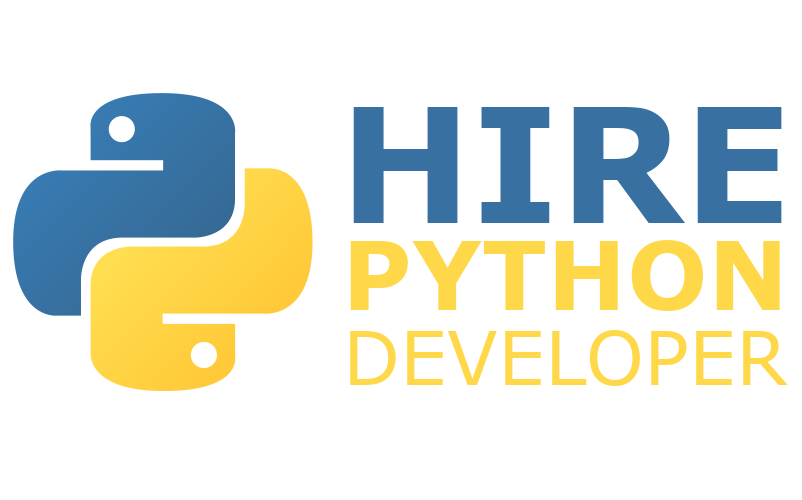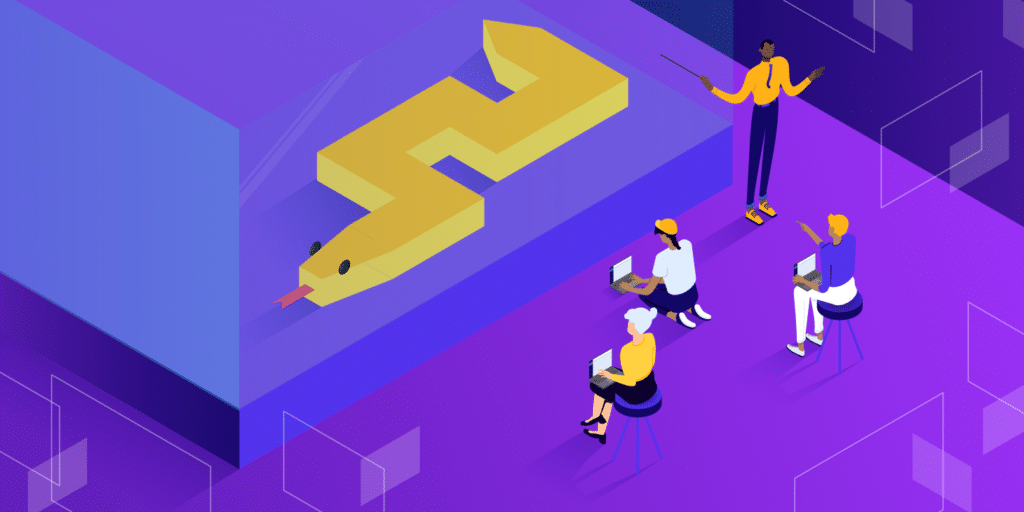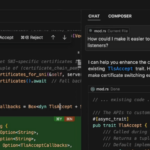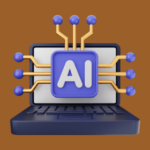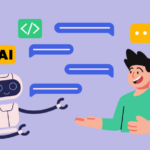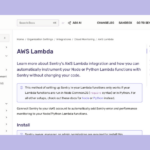Python is a high-level, interpreted, general-purpose programming language that has become one of the most popular languages in the world. It’s easy to learn, and it has a large number of libraries, modules, and tools that make it a versatile language for a wide range of applications.
As a result, the demand for skilled Python developers has skyrocketed in recent years, making it an excellent career option for those interested in technology and software development.
In this simple guide, we’ll take a closer look at what a Python developer does, the various career paths available in Python development, the skills and qualifications required for success, and the steps you can take to get started in a Python development career.
What Does A Python Developer Do In His Work?
A Python developer is responsible for writing server-side web application logic. They develop back-end components, connect the application with the web services, and support the front-end developers by integrating their work with the Python application.
A Python developer’s primary focus is on writing reusable, testable, and efficient code.
Python developers are also responsible for the maintenance and development of existing applications, fixing bugs, and adding new features. They work with other developers and stakeholders to identify and solve problems and implement new solutions.
Python developers must be able to troubleshoot, debug, and optimize applications to ensure they perform optimally.
Different Types of Python Developers
The field of Python development is broad and offers a range of specializations. Here are some of the most common types of Python developers:
Full Stack Python Developer
A full stack Python developer is responsible for developing both the front-end and back-end components of a web application. They have a solid understanding of both front-end technologies such as HTML, CSS, and JavaScript and back-end technologies such as Python, Flask, and Django.
Back-End Python Developer
A back-end Python developer focuses on the server-side of web development. They work with databases, servers, and APIs to create the underlying systems that support web applications.
Data Scientist
Data scientists use Python to process and analyze large amounts of data. They use libraries such as NumPy, Pandas, and Matplotlib to perform data analysis and create data visualizations.
Machine Learning Engineer
Machine learning engineers use Python to build and deploy machine learning models. They use libraries such as TensorFlow, PyTorch, and scikit-learn to create algorithms that can learn from data and make predictions or decisions.
Skills and Qualifications Required for a Career in Python Development
To be successful in a career in Python development, you’ll need to possess a certain set of skills and qualifications. These include:
Strong Knowledge of Python
You’ll need a deep understanding of the Python programming language, including its syntax, data structures, and libraries.
Familiarity with Django or Flask
Most web applications in Python are built using either the Django or Flask web framework. It’s important to have experience with at least one of these frameworks.
Understanding of SQL and Databases
Python developers often work with databases, so it’s important to have a solid understanding of SQL and database management systems.
Knowledge of HTML, CSS, and JavaScript
While not essential, having knowledge of front-end technologies such as HTML, CSS, and JavaScript can be helpful for full-stack Python developers.
Problem-Solving Skills
Python developers must be able to troubleshoot, debug, and solve complex problems. They must have strong analytical and critical thinking skills and be able to come up with creative solutions to problems.
Good Communication Skills
Python developers often work in teams, so it’s important to have strong communication skills. They must be able to communicate effectively with other developers, stakeholders, and clients to ensure the smooth development and delivery of projects.
Continual Learning
The technology industry is constantly evolving, and Python is no exception. Python developers must be proactive in staying up-to-date with new developments, technologies, and tools in the field.
They must have a passion for learning and be willing to continually enhance their skills and knowledge.
Steps to Get Started in a Python Development Career
If you’re interested in a career in Python development, here are some steps you can take to get started:
Learn Python
The first step to becoming a Python developer is to learn the language. You can start by reading books, taking online courses, or attending coding bootcamps.
Gain Experience with Django or Flask
Once you have a solid understanding of Python, it’s time to start working with Django or Flask. Choose the framework that you feel most comfortable with and start building web applications.
Build a Portfolio
As you gain experience, start building a portfolio of your work. This will showcase your skills and abilities to potential employers and help you stand out from other candidates.
Get Involved in the Python Community
Get involved in the Python community by attending meetups, contributing to open-source projects, and participating in online forums. This will give you the opportunity to network with other Python developers and learn from their experiences.
What Does Python Code look like?
Python code is typically written in plain text files with a .py extension. Here’s an example of a simple Python code
def factorial(n):
if n == 0:
return 1
else:
return n * factorial(n - 1)
number = 5
result = factorial(number)
print(f"The factorial of {number} is {result}.")In this code, we define a function called factorial that takes an input n. The function uses recursion to calculate the factorial of n. If n is equal to 0, it returns 1 (the base case). Otherwise, it multiplies n by the factorial of n-1.
We then assign a value of 5 to the variable number and call the factorial function with this value. The returned result is stored in the variable result. Finally, we print the result using formatted string syntax.
What are the responsibilities of a Python developer?
A Python developer is responsible for writing server-side web application logic. They develop back-end components, connect the application with the other web services, and support the front-end developers by integrating their work with the Python application. A Python developer’s responsibilities may also include writing reusable, testable, and efficient code, designing and implementing low-latency, high-availability, and performance applications, and integrating data storage solutions.
What skills are required for a career in Python development?
To be successful in a career as a Python developer, one should have strong knowledge of Python programming, along with experience in web development using Python frameworks such as Django or Flask. Other essential skills for a Python developer include a strong understanding of databases, proficiency in HTML, CSS, and JavaScript, experience with version control systems like Git, and excellent problem-solving and debugging skills.
What is the role of a Python developer in a software development project?
A Python developer plays a crucial role in software development projects. They are responsible for writing server-side code and integrating it with the front-end code. Python developers also collaborate with other members of the development team, such as designers and project managers, to ensure the successful completion of the project.
How does a Python developer differ from other types of software developers?
A Python developer is a type of software developer who specializes in using the Python programming language to develop web applications.
They may also have experience with other programming languages, but Python is their primary focus. Python developers differ from other types of software developers, such as front-end developers, in their focus on server-side web application development and their use of the Python programming language.
What is the typical workday of a Python developer like?
A Python developer’s typical workday may include writing and testing code, debugging and fixing issues, collaborating with team members, and attending meetings. They may also spend time researching new technologies and tools to improve their work, and contributing to the development of new features for the applications they work on.
What type of projects do Python developers typically work on?
Python developers typically work on web application development projects, using the Python programming language and its frameworks such as Django and Flask. They may also work on data analysis, machine learning, and scientific computing projects.
What are the key differences between a Python developer and a Python programmer?
The terms “Python developer” and “Python programmer” are often used interchangeably, but there are subtle differences between the two. A Python programmer is someone who writes code using the Python programming language, while a Python developer is a software engineer who specializes in developing web applications using Python.
A Python developer may have a wider range of responsibilities and more experience with web development and deployment compared to a Python programmer.
How does a Python developer contribute to the success of a software project?
A Python developer plays a critical role in the success of a software project. They are responsible for writing high-quality, maintainable code and integrating it with the front-end code. They also collaborate with other team members and provide technical expertise to help resolve any issues that arise during the development process. Python developers also help to ensure that the project is delivered on time and within budget.
What type of organizations hire Python developers?
Python developers are in high demand and can be found in a wide range of organizations, including tech startups, established tech companies, government agencies, and financial institutions.
What Skills Does a Python Developer Need?
As a Python developer, there are several key skills that you need in order to be successful in your role. Firstly, you need to have a strong understanding of the Python programming language itself. This includes being familiar with its syntax, how it handles data structures, and how to write efficient code using Python.
In addition to your technical skills, it’s important to have a solid understanding of software development principles and methodologies. This includes knowledge of software design patterns, data structures, algorithms, and software architecture.
Other essential skills for a Python developer include:
Strong problem-solving skills: Being able to effectively troubleshoot and debug complex issues is key in any programming role.
Attention to detail: As a Python developer, you’ll be responsible for writing code that is clean, readable, and scalable. You’ll need to be meticulous and detail-oriented in order to produce high-quality software.
Good communication skills: Whether you’re working with a team of developers or communicating with clients, being able to effectively communicate technical information is critical.
Familiarity with web development: Many Python developers work on web applications, so it’s important to have a good understanding of web technologies and frameworks.
Experience with databases: Knowledge of databases and how to interact with them using Python is also important for many Python developers.
What Does a Python Developer Do on a Day-to-Day Basis?
The day-to-day duties of a Python developer can vary greatly depending on the size of the company they work for and the specific projects they’re working on. However, there are some common tasks that are part of the role:
Writing and testing code: This is the core responsibility of a Python developer. You’ll be expected to write high-quality, well-structured, and efficient code that meets the requirements of your projects.
Debugging and troubleshooting: You’ll need to be able to diagnose and fix any issues that arise during the development process.
Collaborating with team members: Whether you’re working with other developers, designers, or project managers, you’ll need to be able to work effectively as part of a team.
Participating in code reviews: You’ll be expected to review the code of your colleagues, provide feedback, and help identify areas for improvement.
Staying up-to-date with new technologies: As a Python developer, you’ll need to keep up-to-date with the latest developments in the field, including new libraries and frameworks.
Documenting code: You’ll be responsible for creating and maintaining clear and detailed documentation for your code, to ensure that it’s easily maintainable and understandable by other developers.
What Are Some Common Use Cases for Python?
Python is a versatile programming language that is used in a wide range of applications, including:
Web development: Python is often used for building web applications and dynamic websites. Its ability to interface with databases and work well with front-end technologies make it a popular choice for web developers.
Data analysis: Python is commonly used for data analysis, as it provides a wide range of libraries and tools that make it easy to work with data. This includes libraries for data visualization, machine learning, and natural language processing.
Scientific computing: Python is used in a variety of scientific and engineering fields, as it provides a powerful and flexible platform for performing complex computations.
Wrapping up about what does a Python Developer do
A career in Python development offers a wide range of opportunities and specializations. It’s a highly sought-after field with a growing demand for skilled developers.
To be successful in a Python development career, you’ll need to have a strong knowledge of the language, experience with Django or Flask, and the skills and qualifications outlined above. With dedication and hard work, you can launch a successful career as a Python developer.
Key Takeaways about What Does a Python Developer Do:
Python is a popular programming language that is in high demand.
A Python developer is responsible for writing server-side web application logic.
There are various specializations within Python development, including full stack, back-end, data science, and machine learning.
Strong knowledge of Python, experience with Django or Flask, and strong problem-solving skills are essential for a career in Python development.
To get started in a Python development career, learn the language, gain experience with Django or Flask, build a portfolio, and get involved in the Python community.
If you have any questions about being a Python developer, contact us here.
Matthew is a technical author with a passion for software development and a deep expertise in Python. With over 20 years of experience in the field, he has honed his skills as a software development manager at prominent companies such as eBay, Zappier, and GE Capital, where he led complex software projects to successful completion.
Matthew’s deep fascination with Python began two decades ago, and he has been at the forefront of its development ever since. His experience with the language has allowed him to develop a keen understanding of its inner workings, and he has become an expert at leveraging its unique features to build elegant and efficient software solutions.
Matthew’s academic background is rooted in the esteemed halls of Columbia University, where he pursued a Master’s degree in Computer Science.
As a technical author, Matthew is committed to sharing his knowledge with others and helping to advance the field of computer science. His contributions to the scientific computer science community are invaluable, and his expertise in Python development has made him a sought-after speaker and thought leader in the field.
